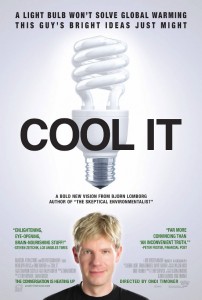 There’s a scene in a new documentary called “Cool It†where Bjorn Lomborg, an environmentalist who approaches global warming as a reality but not a catastrophe, testifies in front of four House Committees in 2007 about what kind of progress we’re making with climate change. You usually see large audiences at these things, but the turnout for Lomborg wasn’t all that amazing, particularly in light of how many people showed up for Al Gore’s testimony in front of the same panel. Given the fact that Gore helped make “An Inconvenient Truth†the fifth highest-grossing documentary of all time, there’s a sense “Cool It†might fall short of it at the box office the same way the crowd for Lomborg that day fell short of Gore’s.
There’s a scene in a new documentary called “Cool It†where Bjorn Lomborg, an environmentalist who approaches global warming as a reality but not a catastrophe, testifies in front of four House Committees in 2007 about what kind of progress we’re making with climate change. You usually see large audiences at these things, but the turnout for Lomborg wasn’t all that amazing, particularly in light of how many people showed up for Al Gore’s testimony in front of the same panel. Given the fact that Gore helped make “An Inconvenient Truth†the fifth highest-grossing documentary of all time, there’s a sense “Cool It†might fall short of it at the box office the same way the crowd for Lomborg that day fell short of Gore’s.
Then again, considering how accessible this material feels, the potential “Cool It†has of becoming a hit is stronger than you might think. Part of that is because of how levelheaded it is – the thought of talking about global warming without frog-and-locust urgency seems confusing, but Lomborg’s data says it’s happening slowly enough for everyone to keep it in check, and that science is already beginning to steer things in the right direction. How else do you explain all that energy coming from those windmills you see in fields?
In fact, with expensive proposals from environmentalists yielding returns that aren’t worth anything near what they cost (Lomborg maintains that spending $40 trillion over the next 90 years on reducing carbon emissions would be 50 times more damaging to the economy than keeping things the way they are), Lomborg says it might be better to spend that money on other global crises like AIDS and malaria, or undrinkable water in Third World countries. He also says fear tends to be counterproductive – it’s ironic that people who kill their lights during Earth Hour compensate with candles that, yes, emit carbon dioxide.
Lomborg, who’s written extensively about this, is founder of the Copenhagen Consensus, a think tank that deals with international development. It makes sense that he’d sound more credible than a nut job like Michael Ruppert from last year’s uninspired “Collapse,†or even a well-intentioned tree hugger like Colin Beavan from the more effective “No Impact Man: The Documentary.†Put those together with “An Inconvenient Truth,†and you’ve got three documentaries that handle the same subject three different ways.
Still another one might seem like overkill, but when you’re dealing with an issue that’s this dividing, we probably need all the help we can get.
This article originally appeared on AllMediaNy.com

Leave a Reply